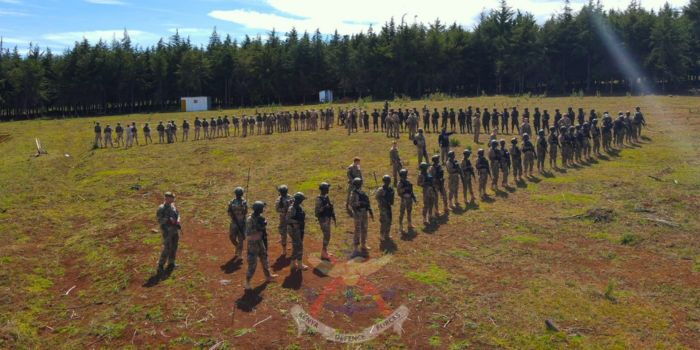60 years into its existence in Kenya, the British Army Training Unit Kenya (BATUK) soldiers are not only benefiting from access to the large number of training areas made available by the Kenyan authorities but also Kenyan women.
The soldiers who are based in Nanyuki, 200 km North of Nairobi, have been put on the spot for occasionally impregnating women around the area and abandoning them.
Some of these pregnancies are consensual while other women decry being raped by the soldiers. Children born out of these relations have now grown and are seeking to be recognised by their British fathers who are said to have abandoned them in Kenya.
According to a report by the Associated Press (AP), a global media outlet, lawyer Kelvin Kubai of Kenya is representing over 10 children who are seeking to reunite with their fathers and at least get recognition and support from them.
A photo of a signpost showing the British Army Training Unit Kenya (BATUK) located in Nanyuki.
British Army
Kubai’s goal is to confront authorities over hundreds of such cases reported over the years and to find the fathers and seek their support.
Louise Gitonga, 26, is one of Kubai’s clients. Gitonga’s mother Margaret Wandia became pregnant after a week-long relationship with a British soldier training in Nanyuki.
Wandia met Gitonga’s father during her 20s while she worked at a bar around the soldier base. They got into a relationship and she got pregnant. Unfortunately for her, the British soldier left the country never to come back or offer any support.
Jenerica Namoru, 29, is another woman raising a 5-year-old she bore with a British soldier. For her, the British man acknowledged the pregnancy and even accepted for his name to be on the birth certificate.
Five years later, she is struggling to raise the child as the father has never chipped in financially. Her efforts to go to the base to ask for help have also been futile.
Apart from being abandoned by their fathers, the British children are also faced with stigma for being white. Parents decry being forced to pay more fees because the children are white. They also face discrimination when looking for jobs.
Kubai in collaboration with a British firm is hoping to send some of these children to Britain to reunite with their fathers. According to British law, children born to British citizens are eligible for British citizenship and care of both parents if they are below 18. Seven of the children Kubai represents are under 18. For those older than 18, the trip is a quest for identity and support.
According to a British High Commission spokesperson in a statement to AP, P said it and the British military training mission in Kenya cooperate fully with local child support authorities where there are claims relating to paternity.
Sentiments that have been strongly denied by Kenyan mothers and civil society groups revealing that they have been of little or no support. They now want their children to receive recognition and support.
The British High Commission Offices in Nairobi, Kenya, December 3, 2024.
Photo
British High Commission


